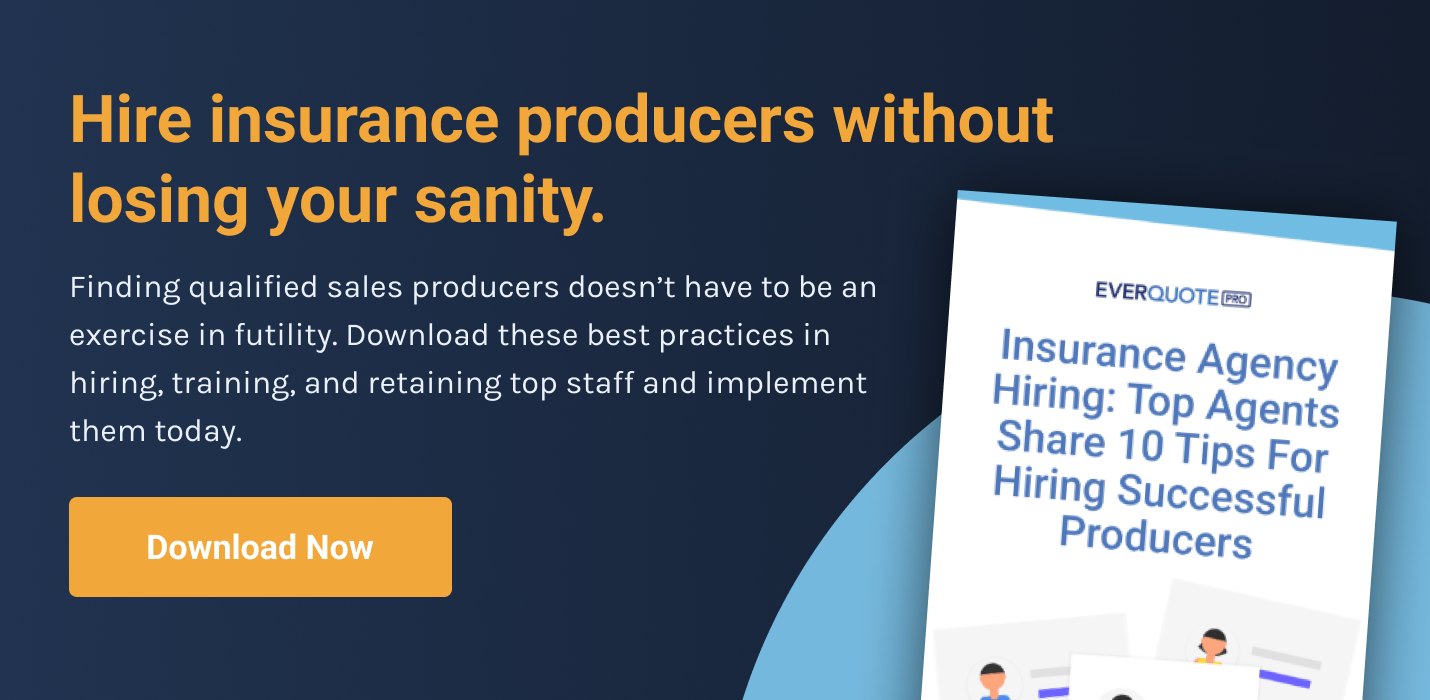- Home»
- EverQuote Pro Blog»
- Hiring Insurance Producers: The Complete Playbook
Hiring Insurance Producers: The Complete Playbook

If you want your insurance agency to be successful, you have to have a great team of people behind you. So where do you start? Tips for hiring salespeople—especially hiring insurance producers—are a dime a dozen. In this article, I want to break through the noise and present to you several tips and best practices that have worked for me as I’ve grown my agency into one of the most successful in the country—and I hope they may be helpful to you.
3 Top Things I look For In Hiring Insurance Producers & Agents
I look for only three things when hiring insurance producers or agents for my business:
1. A winning attitude
Does their outlook fit the culture of my business? To me, this is more important than anything else. An amazingly talented producer can destroy your office if they have a negative attitude. No matter how good they are at selling, if the team around them isn’t happy, your culture will suffer—and so will you. (Tweet this!)
2. An unbeatable work ethic
It sounds so simple, but this one can be hard to figure out. I can’t afford to hire someone who won’t work for my business like it’s their own business. You can teach someone how to sell or you can teach someone customer service, but work ethic is something that can not be taught. If it’s between hiring someone with sales experience but a so-so work ethic and someone with no sales experience but a great work ethic, I’ll virtually always choose the person with the great work ethic.
3. An ability to learn
I don’t necessarily need people who know insurance. (Usually, that’s not something I look for at all!) What I’m really looking for during the interview phase is a team player who is hungry to learn more about my company, my values, and my products. They don’t need to know everything right now, they just have to be willing to do the work.
Every person who sells insurance needs these three things! I can teach you everything else, but I can’t teach you to have a good attitude, work hard, and be eager to learn. But how do I find people like this? Keep reading to find out.
How To Find The Right Hire: My Interview Process
Before I interview a single candidate, I write up a detailed description of the perfect employee. Most people can’t visualize the perfect employee outside of hitting quotas or producing results, and it’s not realistic because a “perfect” employee doesn’t exist. The truth is, I’m not even the perfect hire! What this exercise does is allows me to brainstorm everything I value in a hire; then I break out the top five to 10 things. Finding the top five things I absolutely require in an employee not only helps me judge each candidate, it also helps me provide the training that matches what I’m looking for in an employee.
Then, in order to find the insurance producers I want to work for my agency, I have a specific interview process:
- I describe what the job entails. I don’t gloss over what this new hire will be doing—if they take this job, they should know their roles and duties.
- I am frank about the level of difficulty. Before hiring insurance agents and producers, I’m honest with them about the hard parts of this business. I don’t want them on my team if they aren’t sure they can handle it.
- I outline my expectations of them as a producer at my agency.
- I require them to interview with two to three other agencies before I hire them. I want any potential agent or producer to pass the interview phase with other companies, but I want them to choose mine because they want to be here—part of my company culture and atmosphere—not just because they want any job.
- I employ a personality profile called Can They Sell. In my experience, the people I end up hiring most often fall right in the middle of this inventory—they’re not really a hardcore sales person, and they’re not really a service-only person. This is contrary to what you may hear from some agents, who look only at sales aptitude. However, I’ve found that because insurance does require a level of customer service in order to follow up and serve accounts, it’s important to find a potential producer who is well balanced and enjoys both selling and the customer service aspect. Speaking of personality profiles, I also look for a balanced personality—someone who’s not at either extreme of introversion or extroversion.
- If I like a candidate and believe they have potential, I will hire as many as possible—there’s no cap! I fill as many desks as I can, because it’s inevitable that some producers simply don’t work out for the long term. Staff up as much as possible. As you start training, procuring licenses, etc., you will have many new hires fall off.
3 Signs Someone Won't Be A Good Insurance Producer
Sometimes, it’s helpful to have a list of “red flags”—signs someone won’t fit with your agency. This is crucial, because if I hire you, you become part of my agency family—and we can’t afford to bring in someone who will not last. Here’s my list of signs to watch out for.
- Lack of a sense of humor. If they can’t joke, they won’t fit in at my office. There are a lot of ups and downs in the insurance industry, and we must have the ability to have fun.
- Poor communication skills. From their first interview, I need to see that a prospective agent or producer can have back-and-forth conversations, with no awkwardness.
- Willingness to meet with my team. I require potential new hires to do an all-day shadow of my office. It’s crucial for them and us to see what it’s really like on our team. It also allows my staff to give feedback on whether or not they think the candidate will mesh well with the group.
How To Move On From Bad Producers
From time to time, everyone makes a bad hire. (Hopefully, it’s not too often!) Here’s what I suggest insurance agents do if and when the time comes to move on from a bad hire.
I constantly monitor the state of my office.
It’s a priority for me to pay attention to the interactions between members of my team. I am tuned in to how people are working with each other, what they’re saying, and how they’re feeling.
I write out my thoughts before I talk to a producer or let them go.
I evaluate him or her from a both a business perspective and a personal perspective:
- From a business perspective, do they have the skills needed? Can training fix the problem, or is it an issue beyond that?
- From a personal perspective, do I think this person won’t be successful in the long term? Could a change be a good thing for them, too?
- Do I have the data to prove they are validating their seat in my office? This is not just production-related, but includes qualitative data as well.
This exercise helps me bring order and structure to my thoughts, and can help me evaluate whether or not issues can be solved through solutions like training.
I don’t react immediately, but do begin documenting what’s going on.
Unless it’s an emergency situation and I have no choice but to act, I typically take about a month to validate my reasons. During this time, I am gathering evidence and proof about why the hire may not be working out.
Training Vs. Termination
One of the biggest conundrums agents run into with underperforming producers is knowing whether to fire them or provide more training. I address this problem by looking through their leading and lagging indicators.
No one can control if a prospect says yes or hangs up on a phone call (a lagging indicator), but we can all control things like doing your work, asking follow-up questions, and asking for referrals (leading indicators). If a producer is performing well in terms of leading indicators, then I am apt to provide additional training or help—not terminate their job.
I provide a transition period.
In a healthy relationship that’s just not working out, instead of offering severance pay or money, I offer to keep the person on my team in a new capacity. I pull them off of sales, but keep paying them to help around the office; I also promise to provide them a letter of recommendation for other job opportunities while they figure out what they need to do. I give them two weeks to help them transition out of my company.
What else can you do to equip your insurance producers for success?
Finding the right people to serve as insurance producers in your agency is fundamental to your success, but it’s not all you should be doing. In addition to training and onboarding your new insurance producers, you should be filling their pipelines with leads to work.
That’s where EverQuote comes in. We provide agencies like yours with qualified leads—people who are actively looking for insurance products—in real-time. Our system works for thousands of agents, and it could be what helps your agency reach that next level of success. You can schedule a call to talk with us about our process here.
Unlock predictable growth with EverQuote.
Our representatives are standing by to help you succeed.
Call 844-707-8800
Weekdays, 9AM-5PM (ET)
Call 844-707-8800
Weekdays, 9AM-5PM (ET)
Accelerate your growth.
Complete the form below or just call 844-707-8800 to learn how we can help you achieve your goals.
By clicking "Get Started", I consent by electronic signature to being contacted by EverQuote, including by automatic telephone dialing and/or an artificial or prerecorded voice (including SMS and MMS - charges may apply), regarding EverQuote for Agents, even if my phone number is listed on a Do Not Call Registry. I also understand that my agreement to be contacted is not a condition of purchasing any goods or services, and that I may call (844) 707-8800 to speak with someone about EverQuote for Agents.
By clicking "Get Started", I affirm that I have read and agree to this website’s Privacy Policy and Terms of Use, including the arbitration provision and the E-SIGN Consent.
* Mandatory fields
 Product Overview
Product Overview Blog
Blog FAQs
FAQs Webinars
Webinars eBooks & Resources
eBooks & Resources